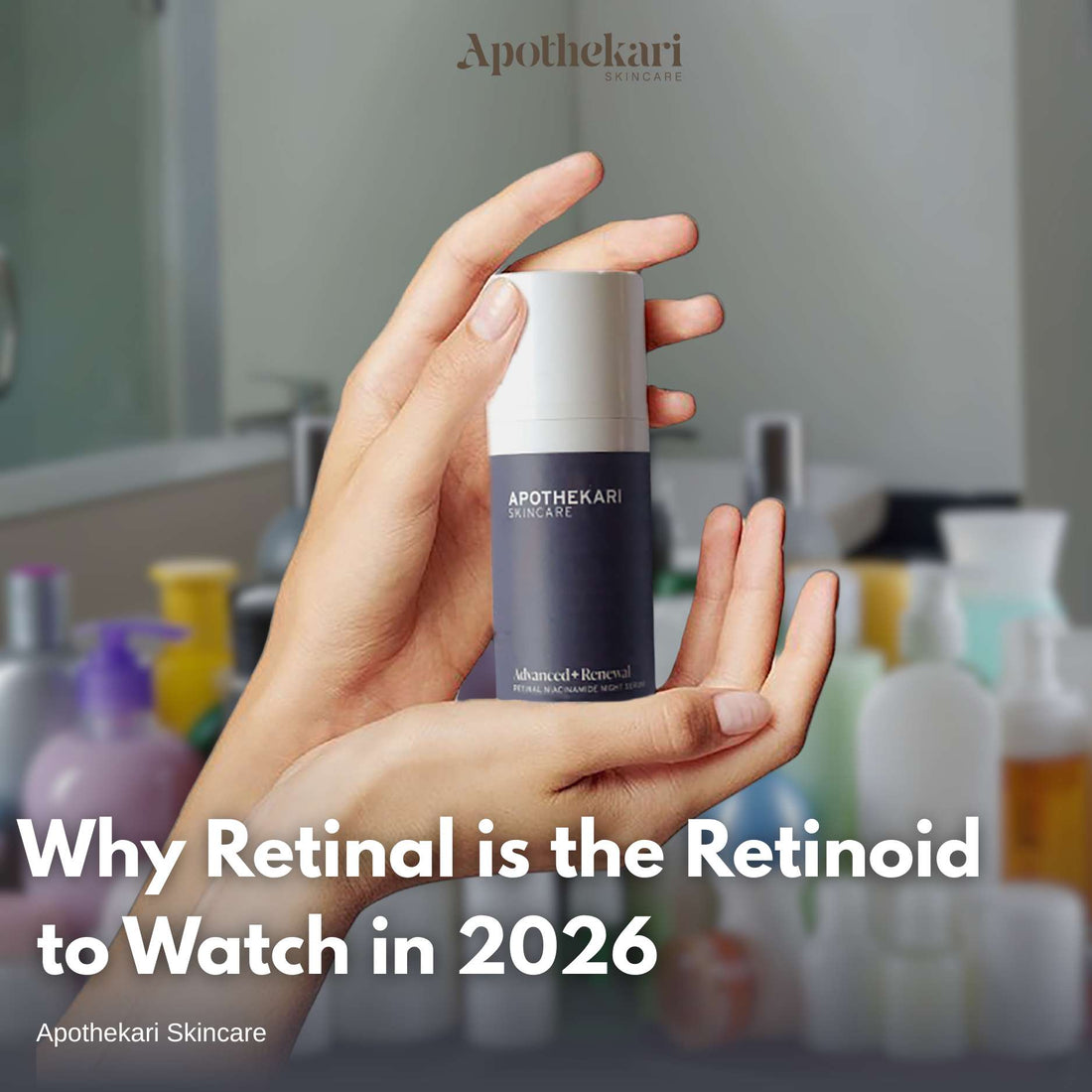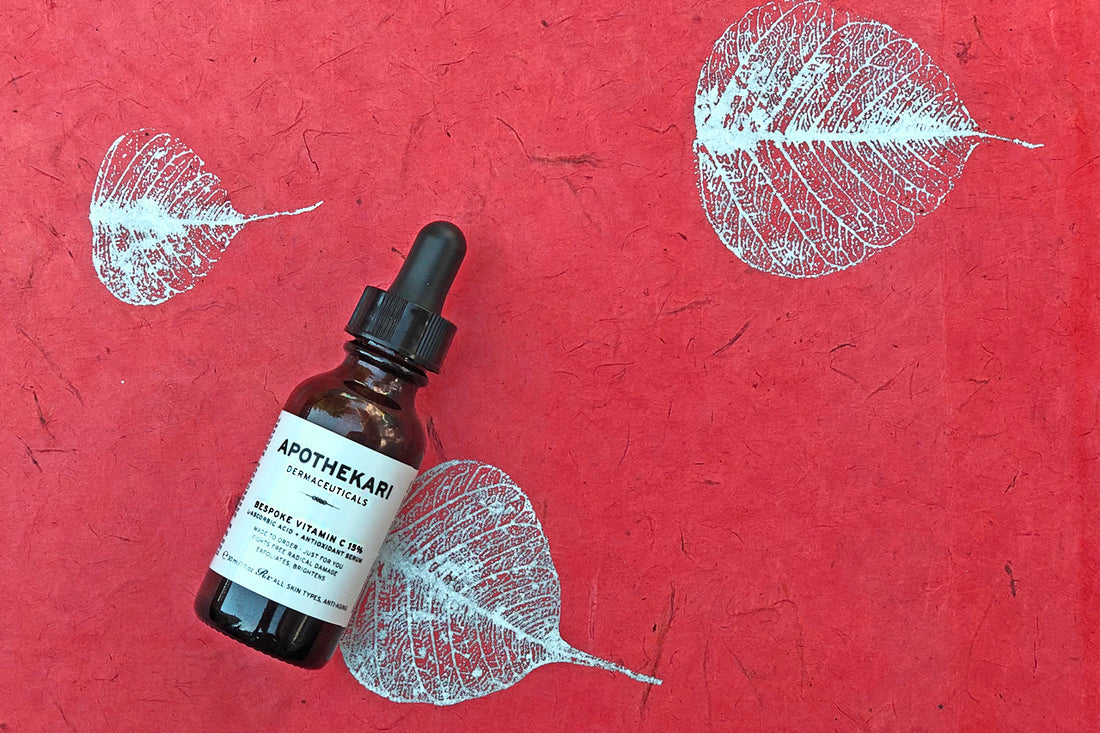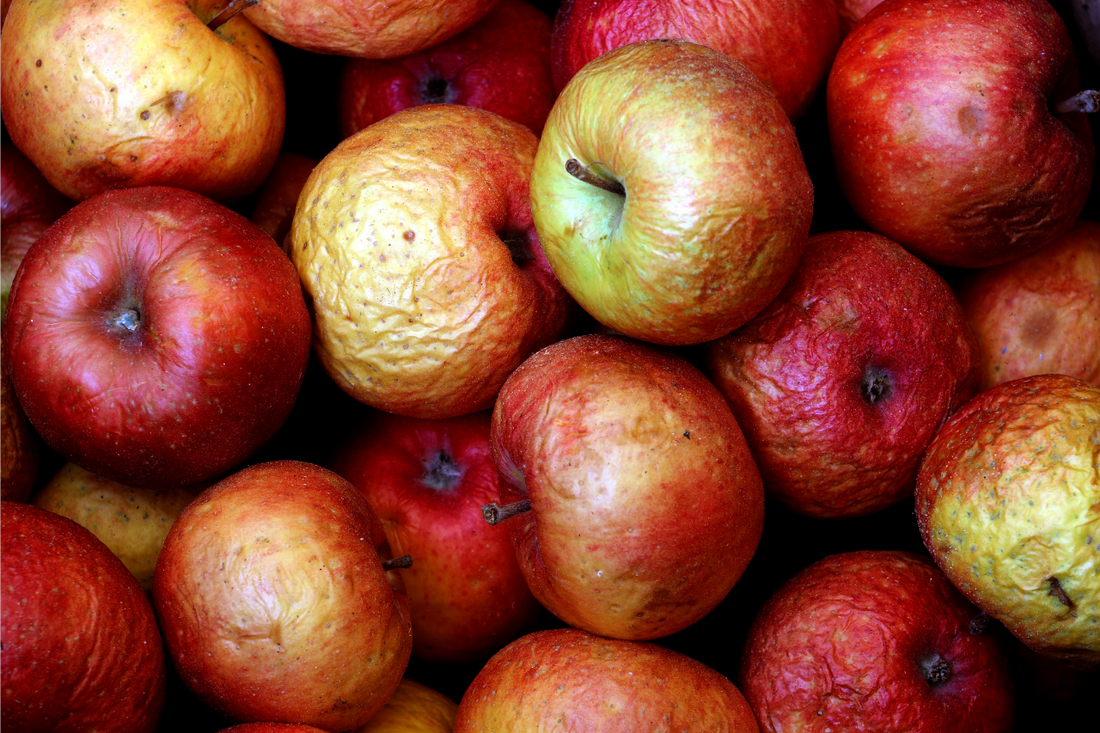Blog
Why Retinal is the Retinoid to Watch in 2026
Retinol had its moment—now retinal is stepping up. Discover why retinal works faster, delivers visible results, and is the must-have vitamin A of 2026. Learn the science, benefits, and how Apothekari’s Advanced+ Renewal Serum makes it easy to glow without the drama.
Learn more3 Foods to Avoid For Your Skin During The Holidays
Some foods are just better for our health than others – here are 3 foods to avoid when it comes to your skin and your overall wellness during the holidays this year. While the relationship between flawless, glowing skin and diet isn’t yet crystal clear, there is some evidence linking specific foods to skin flare-ups and other nutrient-rich foods to skin benefits. Learn more in this post. SHOP RADIANT SKIN SET What Food Should Be Avoided For Skin? (Sugary Treats!) Beautifully decorated cookies, holiday chocolates & decadent macarons are in abundance at this time of year. Though they may taste good going down, over consumption can lead to glycation, resulting in the formation of advanced glycation end products (AGEs), which can induce free radical damage and cause deterioration of the skin. The end-result? A loss of elasticity and the development of fine lines and wrinkles. Sugar has become one of the most vilified foods for its negative impact on overall wellness, including our skin’s appearance. We’re not saying never, but try to limit your servings when possible. Or, indulge a sweet tooth with a small amount of fresh fruit or dark chocolate. 2 More Foods to Avoid: Alcohol & Salty Foods Alcohol and salty foods cause dehydration, which can leave skin looking pasty, puffy and more visibly wrinkled. Boozy holiday cocktails often contain a lot of sugar (see above), which can exacerbate the signs of skin aging. These are two foods to avoid when it comes to your skin; moderation is key. Reach for the water, a mocktail or a spritzer when it comes to beverages and load up on crudites instead of the chips. These choices will help to ensure you stay hydrated while nourishing your body with essential vitamins and minerals. What Foods Make Your Skin Better? It’s well known that certain nutrients are essential to good health. Minerals like magnesium and calcium; vitamins A, B, C and D; omega-3 fatty acids; lean protein; fibre; micronutrients…the list goes on. For healthy skin, the research isn’t so clear. But, given that it’s the body’s largest organ, it makes sense that what’s good for the body, is (in general) what’s good for the skin. A diet that keeps your inside healthy will help deliver glowing and beautiful skin as well. The occasional splurge isn’t going to ruin your complexion, but a consistently poor diet is bound to have implications. Several experts whose expertise straddles both nutrition and dermatology are here to tell you which foods may support smooth, healthy skin, and which foods are more likely to lead to rashes, blemishes, and breakouts. Try to Maintain Your Skin Care Routine Wherever Possible Work parties, family gatherings and extra social outings put temptation in front of you during the holidays and it’s only human nature to indulge. Have a sugar cookie, enjoy a glass of eggnog and try that new cheese your cousin bought just for you. It’s important to enjoy life too! While late nights and an over extended social calendar can disrupt routines, try to exercise, get enough sleep and choose healthy food options when you can for the health of both your skin and your body. When it comes to your skin, don’t neglect to cleanse your face before falling into bed. This will help to remove dirt and makeup that can lead to clogged pores and breakouts. Besides cleansing, if there are only two things you can remember to use, make it the serums in our Radiant Skin Set. It includes our Bespoke Vitamin C Serum (for morning) and our A is for Anti-Aging Serum (for night), which will help to protect against inflammation and free radical damage and deliver the glowing skin you want to show the world for the holidays! SHOP RADIANT SKIN SET Happy Holidays All!
Learn moreThis Serum Can Fight Free Radicals
Learn how to fight free radicals, molecules which can damage skin, by adding this serum to your daily skincare routine. Shop Bespoke Vitamin C 15% What Are Free Radicals? ‘Free radicals’ AKA Reactive Oxygen Species (ROS) impact our health, including that of our skin. They are created in our bodies as a result of exposure to certain different physical or chemical conditions or illness, including pollution, UV rays, some pesticides and smoke along with the consumption of excess alcohol and some fried foods. Free radicals are thought to contribute to diseases such as heart disease, autoimmune disorders (like rheumatoid arthritis), diabetes and degenerative diseases (Huntington’s or Parkinson’s disease) as well as cancer. Age-related changes in our appearance, including a loss of skin elasticity, wrinkles, graying hair, hair loss, and changes in hair texture are also thought to be related to free radicals. That’s why it’s important to fight free radicals. How to Fight Free Radicals in Skin Once free radical damage starts, it’s thought that a ‘cascade’ of damage occurs, producing more free radicals and speeding up the process of cell damage. This buildup of free radicals offers one explanation for why even healthy bodies age and deteriorate over time. Antioxidants are highly stable molecules, which donate an electron to free radicals, reducing their path of destruction and thereby lessening the damage they cause. Because they are so stable, antioxidants can do this without becoming free radicals themselves. Our bodies make several important antioxidants – glutathione, catalase, superoxide dismutase – and we can help to fight free radicals even further by consuming antioxidant rich foods or by applying them topically. One single antioxidant isn’t enough; we benefit from a combination of including the following: Vitamin C Vitamin E Ferulic acid Green Tea Resveratrol Coenzyme Q10. Apothekari Bespoke Vitamin C Serum is made with a combination of antioxidants and designed to fight free radicals, promote collagen synthesis, brighten skin tone and improve the appearance of aging skin. It is available in a 10% (sensitive skin) or 15% concentration (non-sensitive skin) and each bottle is made fresh to order, guaranteeing its potency. Apply to skin daily every morning to fight free radicals leaving skin looking more youthful and radiant. Top Tip: Eat Your Antioxidants While the topical application of antioxidants is beneficial to skin, we can’t discount the importance of nutrition. Fruits, vegetables and spices including onion, garlic, turmeric, cinnamon and ginger are a major source of antioxidants, which can help to reduce the risk of developing certain diseases. Enjoy the variety; it is the spice of life after all!
Learn moreHow To Reduce Wrinkles
If you’re curious about how to reduce wrinkles, this post explains that. Wrinkles are one of the most common symptoms of aging skin, but using the right products – a sunscreen like Shade SPF 30 and a retinoid like A is for Anti-Aging Serum, can help to reduce them. Shop A Is for Anti-Aging Serum (Our Retinoid Formulation) What is a Wrinkle? Wrinkles are creases, folds, or ridges in the skin, which tend to appear as we get older. They are most frequently found on parts of the body that are exposed to sunlight, including the face, the neck and chest, the back of the hands and the arms. Sun damage, smoking, some medications and dehydration along with environmental and genetic factors can influence their development. Facial expressions, such as repeatedly smiling, frowning, or squinting may also lead to fine lines and wrinkles. And, the thinner, drier and less elastic skin that accompanies aging, impact their formation as well. Younger skin has more elasticity, allowing it to spring back. The aging process makes springing back harder and less frequent, resulting in permanent lines aka, wrinkles. Wrinkles – Lifestyle and Environmental Factors Unprotected exposure to UV light is thought to be one of the biggest contributors to wrinkle development. UV rays break down collagen and elastin fibers, which form part of the skin’s supporting network. This damage results in skin that is weaker and less flexible, causing it to droop and wrinkles to develop. This is why sun protection is one of the best things you can do to reduce wrinkles. Wear a broad spectrum, UVA/UVB blocking sunscreen with a minimum SPF of 30 every day, year round. Shade SPF 30 is a naturally safe, mineral-based (zinc oxide) and non-whitening formulation to consider Cover up with clothing, seek shade, wear hats and sunglasses to protect skin against sun damage Smoking speeds up the aging process by reducing blood supply to the skin. Excess consumption of alcohol can result in dehydration, which causes skin to become dry and appear more wrinkled. And finally, sleeping on your side or face contributes to face lines while repetitive facial expressions (like squinting) overworks facial muscles and can result in grooves beneath the skin’s surface, which eventually leads to wrinkles. Treatments That Reduce Wrinkles When it comes to topical ingredients, there are a few that can help, but retinoids, which are derived from vitamin A, are supported by the most amount of research to support their efficacy in the reduction of fine wrinkles. They have also been shown to reduce pigmentation and decrease skin roughness. Retinoids include ingredients such as retinoic acid, retinaldehyde, retinol and retinyl palmitate. They work by increasing the production of collagen and by stimulating the production of new blood vessels in the skin, which improves skin color. It takes about three to six months of regular use before improvements in wrinkles are apparent and the best results take six to 12 months. The one downside of retinoids is that they can cause skin dryness and irritation so it may be useful to gradually work up to nightly applications, especially if you have sensitive skin. Retinaldehyde, which is found in A is for Anti-Aging is effective and one of the gentlest forms of retinoid available, making it suitable for most skin types. Retinaldehyde has the added benefit of being antibacterial, which delivers benefit to acne sufferers as well. A is for Anti-Aging also contains niacinamide, which can stimulate collagen production. The combination helps to minimize fine lines and wrinkles. Keep in mind that retinoids are broken down in sunlight so apply this serum at night in order to maximize benefits. A two-pronged approach will serve you best when it comes to wrinkle reduction: sunscreen every day in the morning and a retinoid each night.
Learn more




